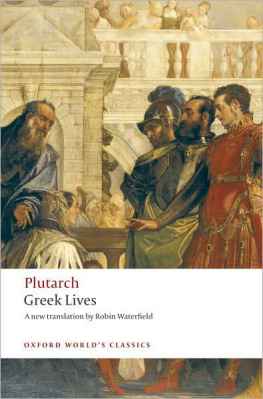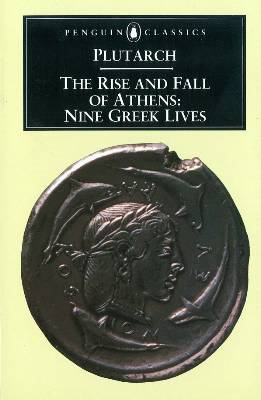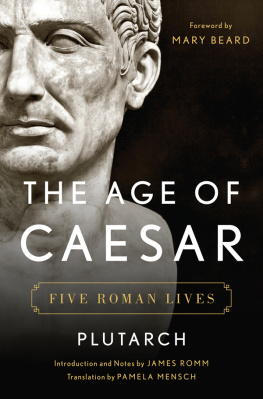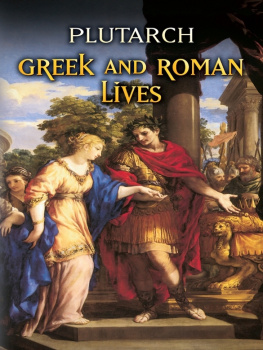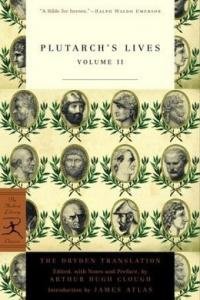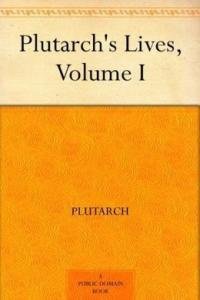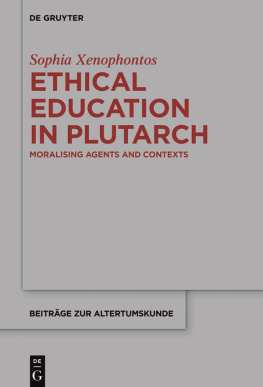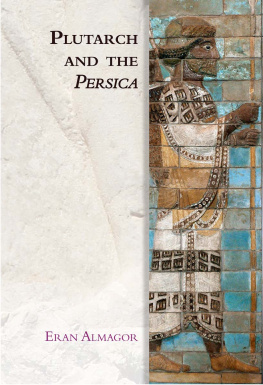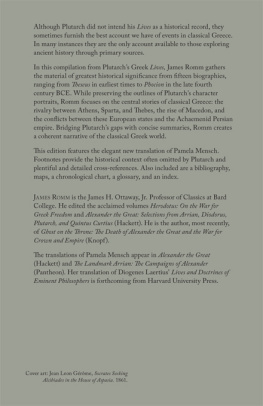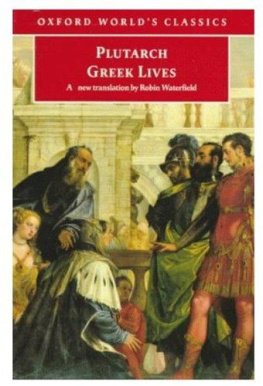Plutarch - Greek Lives
Here you can read online Plutarch - Greek Lives full text of the book (entire story) in english for free. Download pdf and epub, get meaning, cover and reviews about this ebook. year: 2009, publisher: Oxford University Press, genre: Romance novel. Description of the work, (preface) as well as reviews are available. Best literature library LitArk.com created for fans of good reading and offers a wide selection of genres:
Romance novel
Science fiction
Adventure
Detective
Science
History
Home and family
Prose
Art
Politics
Computer
Non-fiction
Religion
Business
Children
Humor
Choose a favorite category and find really read worthwhile books. Enjoy immersion in the world of imagination, feel the emotions of the characters or learn something new for yourself, make an fascinating discovery.
- Book:Greek Lives
- Author:
- Publisher:Oxford University Press
- Genre:
- Year:2009
- Rating:5 / 5
- Favourites:Add to favourites
- Your mark:
- 100
- 1
- 2
- 3
- 4
- 5
Greek Lives: summary, description and annotation
We offer to read an annotation, description, summary or preface (depends on what the author of the book "Greek Lives" wrote himself). If you haven't found the necessary information about the book — write in the comments, we will try to find it.
Greek Lives — read online for free the complete book (whole text) full work
Below is the text of the book, divided by pages. System saving the place of the last page read, allows you to conveniently read the book "Greek Lives" online for free, without having to search again every time where you left off. Put a bookmark, and you can go to the page where you finished reading at any time.
Font size:
Interval:
Bookmark:

Great Clarendon Street, Oxford OX 2 6 DP
Oxford University Press is a department of the University of Oxford.
It furthers the Universitys objective of excellence in research, scholarship,
and education by publishing worldwide in
Oxford New York
Athens Auckland Bangkok Bogot Buenos Aires Calcutta
Cape Town Chennai Dar es Salaam Delhi Florence Hong Kong Istanbul
Karachi Kuala Lumpur Madrid Melbourne Mexico City Mumbai
Nairobi Paris So Paulo Singapore Taipei Tokyo Toronto Warsaw
with associated companies in Berlin Ibadan
Oxford is a registered trade mark of Oxford University Press
in the UK and in certain other countries
Published in the United States
by Oxford University Press Inc., New York
Translations Robin Waterfield 1998
Introduction and Explanatory Notes Philip A. Stadter 1998
The moral rights of the author have been asserted
Database right Oxford University Press (maker)
First published as an Oxford Worlds Classics paperback 1998
All rights reserved. No part of this publication may be reproduced, stored in a retrieval system, or transmitted, in any form or by any means, without the prior permission in writing of Oxford University Press, or as expressly permitted by law, or under terms agreed with the appropriate reprographics rights organizations. Enquiries concerning reproduction outside the scope of the above should be sent to the Rights Department, Oxford University Press, at the address above
You must not circulate this book in any other binding or cover
and you must impose this same condition on any acquirer
British Library Cataloguing in Publication Data
Data available
Library of Congress Cataloging in Publication Data
Plutarch.
[Lives. English. Selections]
Greek lives / Plutarch; translated by Robin Waterfield; with
introduction and notes by Philip Stadter.
Oxford worlds classics (Oxford University Press)
Includes bibliographical references and indexes.
1. GreeceBiography. I. Waterfield, Robin, 1952
II. Stadter, Philip A. III. Title. IV. Series.
DE7.P7213 1988 920.0495dc21 98-17490
ISBN13: 9780192825018
Typeset by Graphicraft Limited, Hong Kong
Printed in Great Britain by
Clays Ltd, St Ives plc
OXFORD WORLDS CLASSICS
For over 100 years Oxford Worlds Classics have brought readers closer to the worlds great literature. Now with over 700 titlesfrom the 4,000-year-old myths of Mesopotamia to the twentieth centurys greatest novelsthe series makes available lesser-known as well as celebrated writing. The pocket-sized hardbacks of the early years contained introductions by Virginia Woolf, T. S. Eliot, Graham Greene, and other literary figures which enriched the experience of reading. Today the series is recognized for its fine scholarship and reliability in texts that span world literature, drama and poetry, religion, philosophy, and politics. Each edition includes perceptive commentary and essential background information to meet the changing needs of readers. Refer to the to navigate through the material in this Oxford Worlds Classics ebook. Use the asterisks (*) throughout the text to access the hyperlinked Explanatory Notes.OXFORD WORLDS CLASSICS

PLUTARCH
Greek Lives
A selection of nine Greek Lives

Translated by
ROBIN WATERFIELD
With Introductions and Notes by
PHILIP A. STADTER

OXFORD WORLDS CLASSICS
GREEK LIVES
P LUTARCH was born about AD 45, and lived most of his life in the small town of Chaeronea in central Greece, dying some time after 120. In the first decades of the second century AD , when he did much of his writing, the Roman Empire was in its most prosperous and peaceful period. Plutarch wrote a large number of dialogues, treatises, and essays covering diverse subjects, such as the oracle at Delphi, vegetarianism, and the nature of love, which are loosely classified as his Moralia or Moral Essays. Alongside these essays, Plutarch created a collection of 46 biographies of ancient Greek and Roman statesmen, arranged in pairs (parallel), a Roman matching a Greek. These Parallel Lives were written when he was at the height of his powers, and are his major and enduring achievement. Drawing upon earlier histories, anecdotes, inscriptions, and his own researches and broad acquaintance, he shaped masterful portraits of the most famous figures of the classical world. The value of the Lives as a historical source, questioned in the nineteenth century, has been reaffirmed by recent scholarship.
R OBIN W ATERFIELD was born in 1952. After graduating from Manchester University, he went on to research ancient Greek philosophy at Kings College, Cambridge. He has been a university lecturer (at Newcastle upon Tyne and St Andrews), and an editor and publisher. Currently, however, he is a self-employed consultant editor and writer, whose books range from philosophy to childrens fiction. He has previously translated, for Oxford Worlds Classics, Platos Republic, Symposium , and Gorgias , Aristotles Physics , and Herodotus Histories.
P HILIP A. S TADTER , Falk Professor in the Humanities at the University of North Carolina at Chapel Hill, is the author of A Commentary on Plutarchs Pericles (Chapel Hill, 1989) and editor of Plutarch and the Historical Tradition (London, 1992). He has written The Public Library of Renaissance Florence: Niccol Niccoli, Cosimo de Medici and the Library of San Marco (Padua, 1972, with B. L. Ullman) and Arrian of Nicomedia (Chapel Hill, 1980), as well as numerous articles and reviews on Plutarch and other ancient historians, including Herodotus, Thucydides, Xenophon, and Arrian.
CONTENTS
To the people and village of Theologos
GENERAL INTRODUCTION
Of all the ancient writers, Plutarch is in many ways the most accessible. Readers as diverse as Beethoven, Rousseau, and Harry Truman have admired the vividness of his narrative and the immediacy of his anecdotes in the Parallel Lives. When he wrote in the first decades of the second century AD , the Roman empire was in its most prosperous and peaceful period. While the emperor Trajan drove back the barbarian tribes of eastern Europe and the Parthians in Asia, expanding the empire to its greatest extent, Plutarch and his friends in Athens, Corinth, and his home town of Chaeronea met, dined, discussed philosophy, and considered the lessons of history. Yet the edge of chaos was not far off. Plutarch was about 23 in 68, when insurrection and civil war ended the reign of Nero: three emperors whirled on and off stage in one year before Vespasian established himself upon the throne. Plutarch later toured the battlefield of Bedriacum in northern Italy with a Roman friend who had fought there, and was told of piles of corpses higher than the tops of the eagle standards: in civil wars no prisoners are taken ( Otho 14). Some twenty years later, the emperor Domitian became afraid that philosophers teaching in Rome might encourage tyrannicides, and expelled them all from the city. Plutarch may well have been among their number. Domitian raged against senators, authors, and others who might oppose him, until he was assassinated in 96. The short reign of Nerva which followed prepared for the twenty-year rule of Trajan (98118).
In this time of recently acquired and still insecure serenity Plutarch lived in Chaeronea and Athens (of which he was also a citizen), teaching philosophy to a small group of young men and writing an enormous volume of work, of which we possess perhaps half. His family wealth and education set him among the lite of Greece, and he regularly entertained powerful and cultured friends, both Greeks and Romans. Since his youth he had served on commissions to meet with the Roman governor, and he was on good terms with Romans of the highest rank. His culture and heritage was fully and proudly Greek, but he like other members of his class accepted the Roman imperial system and worked within it. The nearby sanctuary of Apollo at Delphi, of which he was priest for many years, gave him another occasion to meet important visitors, as well as to investigate both historical and theological questions tied to this venerable site. His cosmopolitan interests did not stop him from serving even in small ways at Chaeronea: he mentions supervising stones and mortar being transported. Living in a small town, which lacked the books and learned discussion which could be found in a large city, he chose to cling to his town, lest it become smaller ( Dem. 2).
Next pageFont size:
Interval:
Bookmark:
Similar books «Greek Lives»
Look at similar books to Greek Lives. We have selected literature similar in name and meaning in the hope of providing readers with more options to find new, interesting, not yet read works.
Discussion, reviews of the book Greek Lives and just readers' own opinions. Leave your comments, write what you think about the work, its meaning or the main characters. Specify what exactly you liked and what you didn't like, and why you think so.

